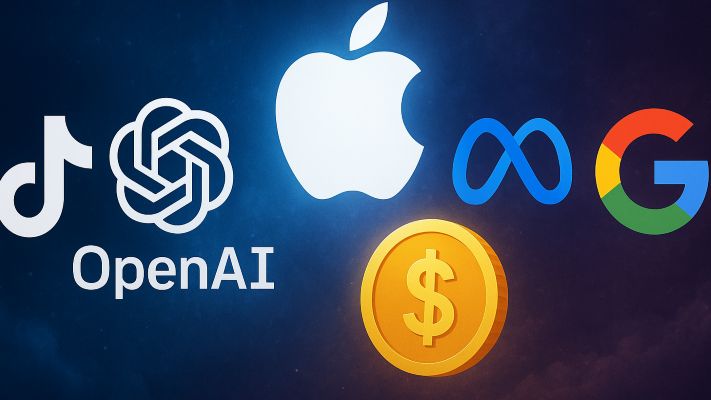AI Navigation
- articleAI Trends
- lightbulb_2AI Tips
- assistant_navigationAI Navigation
- heatHot Articles
- emergency_heat_2Hot Tips
- format_list_numberedPrompt Formatter
- psychologyTest Center(RPI)
AI & Tech Weekly (Sept 29 – Oct 3): OpenAI Challenges TikTok, Apple Boosts Chip Power, Meta’s $14B Bet, and Google’s Political Settlement
The past week in AI was nothing short of eventful.
From OpenAI’s foray into social video apps to Apple’s silent chip acquisition and Meta’s $14 billion GPU deal, global tech giants continue to race toward AI dominance.
Here are the highlights curated by the IAISeek Research Team.

1. OpenAI Launches Sora, a New AI Social App
OpenAI officially released Sora, a new social app that lets users generate and share AI-created videos. The app debuted on iOS, with an Android version in development.
Built on the upgraded Sora 2 video-generation model, users can create short videos from text prompts and explore other creators’ works. Many see it as a direct challenge to TikTok.
Comment:
OpenAI is transitioning from an AI tool provider to an AI-driven social platform, taking aim squarely at TikTok and Instagram Reels.
Sora 2 excels in lip-sync, sound, and background generation—but pure AI content risks flooding the web with “AI junk.”
Content moderation and platform governance will determine whether OpenAI can truly reshape the short-video landscape.
2. CoreWeave Strikes a $14.2 Billion Deal with Meta
CoreWeave announced a long-term partnership with Meta worth $14.2 billion, supplying Nvidia GB300 GPU clusters to power AI model training and product development—including Ray-Ban smart glasses.
Comment:
Leveraging Nvidia’s GPU ecosystem and cloud flexibility, CoreWeave has rapidly become a key infrastructure partner for OpenAI, Microsoft, and xAI.
Meta has been investing heavily in AI—through the open-source Llama models, in-house MTIA chips, and massive data-center expansions—yet still trails its rivals in product maturity.
Whether this deal helps Meta close the gap remains to be seen.
3. Apple Acquires IC Mask Design to Strengthen In-House Chips
Apple quietly completed its acquisition of IC Mask Design, a 150-employee chip design firm founded by Dan Dobberpuhl, the engineer behind the legendary Alpha and StrongARM microprocessors.
The company has worked with more than 250 high-tech clients across 35 countries.
Comment:
The acquisition—finalized in June 2025 but only disclosed in late September—underscores Apple’s push for tighter control over its silicon stack.
IC Mask Design specializes in photomask design and verification, a critical step in semiconductor fabrication.
As Apple Intelligence expands, demand for efficient AI accelerators (NPUs) and low-power chips is soaring.
This move further fortifies Apple’s hardware-AI synergy and long-term competitive edge.
4. Google Pays $24.5 Million to Settle Trump Lawsuit
Google agreed to pay $24.5 million to resolve former U.S. President Donald Trump’s lawsuit accusing YouTube of illegal censorship.
According to the settlement, $22 million will fund the Trust for the National Mall project to build a new White House banquet hall, while $2.5 million goes to other plaintiffs.
YouTube admitted no wrongdoing and will not alter its content-moderation policies.
Comment:
The settlement reflects yet another balancing act between Big Tech power and political influence.
Free speech versus platform responsibility—Google chose to pay the price without conceding policy ground.
It reignites global debates over “platform neutrality” and the blurred line between moderation and censorship.
5. WeRide Secures Belgium’s First L4 Autonomous Driving License
Autonomous-driving leader WeRide now operates 150 robotaxis across the Middle East and recently obtained Belgium’s first federal L4 autonomous-vehicle test license.
WeRide becomes the only company worldwide licensed in seven countries—Belgium, China, France, the UAE, Saudi Arabia, Singapore, and the U.S.
Comment:
WeRide’s autonomous expansion spans Asia, North America, Europe, and the Middle East.
An L4 license allows highly automated operations within designated zones, but true commercialization still faces hurdles—data privacy laws, local regulations, cost management, and public trust.
WeRide is emerging as a benchmark for China’s AI-driven mobility exports.
AI continues to reshape industries—from chips and data centers to video creation and autonomous transport.
As the global race accelerates, innovation and governance remain the twin forces defining its future.
For more AI insights, business analysis, and tech trends, visit:
https://iaiseek.com/en